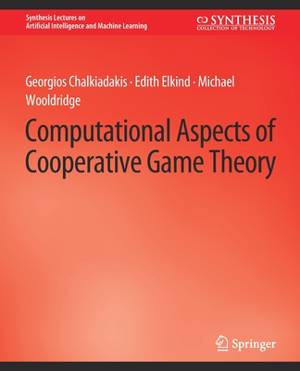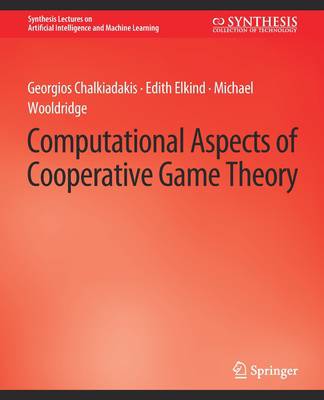
- Afhalen na 1 uur in een winkel met voorraad
- Gratis thuislevering in België vanaf € 30
- Ruim aanbod met 7 miljoen producten
- Afhalen na 1 uur in een winkel met voorraad
- Gratis thuislevering in België vanaf € 30
- Ruim aanbod met 7 miljoen producten
Zoeken
Computational Aspects of Cooperative Game Theory
Georgios Chalkiadakis, Edith Elkind, Michael Wooldridge
€ 36,95
+ 73 punten
Uitvoering
Omschrijving
Cooperative game theory is a branch of (micro-)economics that studies the behavior of self-interested agents in strategic settings where binding agreements among agents are possible. Our aim in this book is to present a survey of work on the computational aspects of cooperative game theory. We begin by formally defining transferable utility games in characteristic function form, and introducing key solution concepts such as the core and the Shapley value. We then discuss two major issues that arise when considering such games from a computational perspective: identifying compact representations for games, and the closely related problem of efficiently computing solution concepts for games. We survey several formalisms for cooperative games that have been proposed in the literature, including, for example, cooperative games defined on networks, as well as general compact representation schemes such as MC-nets and skill games. As a detailed case study, we consider weighted voting games: a widely-used and practically important class of cooperative games that inherently have a natural compact representation. We investigate the complexity of solution concepts for such games, and generalizations of them. We briefly discuss games with non-transferable utility and partition function games. We then overview algorithms for identifying welfare-maximizing coalition structures and methods used by rational agents to form coalitions (even under uncertainty), including bargaining algorithms. We conclude by considering some developing topics, applications, and future research directions.
Specificaties
Betrokkenen
- Auteur(s):
- Uitgeverij:
Inhoud
- Aantal bladzijden:
- 150
- Taal:
- Engels
- Reeks:
Eigenschappen
- Productcode (EAN):
- 9783031004308
- Verschijningsdatum:
- 26/10/2011
- Uitvoering:
- Paperback
- Formaat:
- Trade paperback (VS)
- Afmetingen:
- 190 mm x 235 mm
- Gewicht:
- 303 g

Alleen bij Standaard Boekhandel
+ 73 punten op je klantenkaart van Standaard Boekhandel
Beoordelingen
We publiceren alleen reviews die voldoen aan de voorwaarden voor reviews. Bekijk onze voorwaarden voor reviews.











